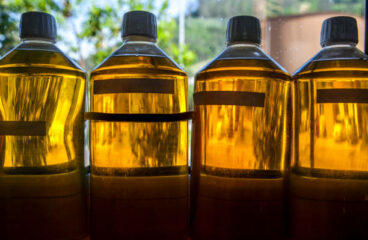Biodiesel 101

- What is Biodiesel?
Biodiesel is a liquid fuel produced from renewable sources, such as new and used vegetable oils and animal fats, and is a cleaner-burning replacement for petroleum-based diesel fuel. Biodiesel is non-toxic and biodegradable and is produced by combining alcohol with vegetable oil, animal fat, or recycled cooking grease.
- How is the Biodiesel used?
Like petroleum-derived diesel, biodiesel is used to fuel compression-ignition (diesel) engines. Biodiesel can be blended with petroleum diesel in any percentage, including B100 (pure biodiesel) and, the most common blend, B20 (a blend containing 20% biodiesel and 80% petroleum diesel).
- Why the Biodiesel is good for the humanity?
Biodiesel is a renewable, biodegradable fuel manufactured domestically from vegetable oils, animal fats, or recycled restaurant grease. Biodiesel meets both the biomass-based diesel and overall advanced biofuel requirement of the Renewable Fuel Standard.
- How is the Biodiesel manufactured?
Biodiesel is manufactured from plant oils (e.g., soybean oil, cottonseed oil, canola oil, corn oil); recycled cooking greases or oils (e.g., yellow grease); or animal fats (beef tallow, pork lard); and various combinations of these feedstocks. Used cooking oils are mostly plant-based but may also contain animal fats. The biodiesel manufacturing process converts oils and fats into chemicals called long-chain mono-alkyl esters. These chemicals are also referred to as fatty acid methyl esters (FAME), and the process is referred to as esterification. The ASTM D6751 definition of biodiesel states that biodiesel is composed of “mono-alkyl esters of long-chain fatty acids derived from plant oils or animal fats.
- Why using Biodiesel?
Biodiesel is the most diverse fuel on the planet. Biodiesel’s ability to find new uses for fats and oils makes it an ideal advanced biofuel, reducing emissions by more than 50 percent compared to petroleum. Biodiesel is a simple solution for users. It fits seamlessly with today’s diesel infrastructure. In other words, it fits in existing vehicles and technologies.
- Biodiesel performance vs. Petroleum diesel
Typically blended with petroleum diesel, biodiesel blends provide performance characteristics similar to diesel, such as:
* Fuel economy
* Horsepower
* Torque
Biodiesel can provide additional performance benefits to include (depending upon fuel type and concentration):
* Enhanced lubricity, which can extend engine life
* Improved combustion from higher Cetane Number values
* Improved emissions over petroleum-based fuels
- Environmental benefits of the Biodiesel
Biodiesel has several environmental benefits when compared to petroleum-based diesel fuel:
* Reduces lifecycle greenhouse gases by 86 percent
* Lowers particulate matter by 47 percent, reduces smog, and makes our air healthier to breathe
* Reduces hydrocarbon emissions by 67 percent
* For every unit of fossil energy, it takes to produce biodiesel, 3.5 units of renewable energy are returned, the best of any U.S. fuel